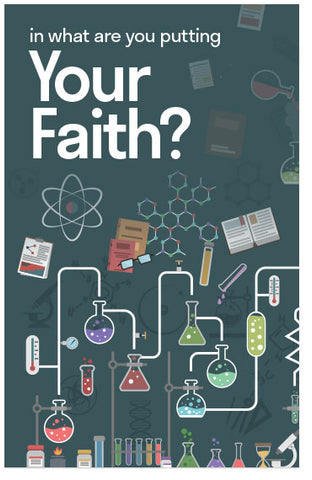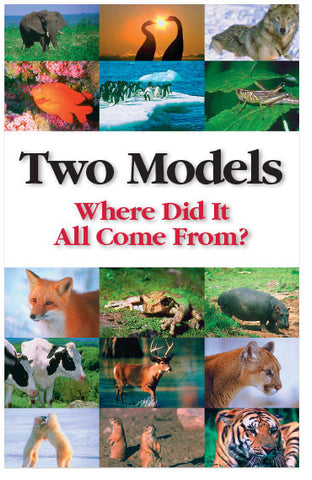What Does Science Have To Say About Your Worldview?
Special-Order Folded Tract
 NOTE: This item is custom-printed to order (click for more details).
NOTE: This item is custom-printed to order (click for more details).
This tract is from our print-on-demand library, and is not kept in stock. Select the options below, and we will custom-print a batch just for you. Because this item is custom-printed, you can add your custom imprint to the back page at no extra cost.
- Estimated shipping date: Thursday, March 26 (Click for more details)
- SKU:
- Discounts: Discount coupons do not apply to this item
- Format: Folded Tract
- Size: 3.5 inches x 5.5 inches
- Pages: 6
- Imprinting: Available with 5 lines of custom text
- Version: NKJV
- Returns: Because this item is custom-printed to order, it cannot be returned.
Show all item details
The full text of this tract is shown below in the NKJV version. (Do you want to print this tract in a different version than the one listed? Contact us and let us know what you're looking for—we may be able to create the alternate version for you at no charge.)
Our worldview is of vital importance. It will determine how we view ourselves and the world we live in. What we believe is “true” about our origins and purpose will profoundly affect how we live life and whether we have any hope. Are these “truths” scientifically sound?
Let’s analyze 2 opposing worldviews…
Darwinian Evolution Assumes:
Darwinian Evolution assumes the universe began of natural causes about 13.7 billion years ago with an explosion known as “The Big Bang.”
Life “probably” began with spontaneous generation, when two amino acids inexplicably came together by random chance to form life.
“Darwinian Evolution” assumes the vast array of life all evolved from a simple life form by mutations (slight modifications in the code) and natural selection (which preserves “positive mutations” through survival of the fittest).
You evolved by random chance and only the strong survive. There is no God and no hope of life after death, therefore, no future judgement or rewards which leaves no motivation to live moral lives unless you view it as beneficial.
Science Laws:
The first Law of Thermodynamics, coupled with The Conservation Principle, observe that nothing in the natural universe can create or destroy matter or energy.
Biogenesis observes that all life comes from parent life forms similar to themselves. It opposes the medieval belief of Spontaneous Generation of Life, which assumes life has come from non-life (a scientific impossibility).
The Second Law of Thermodynamics observes that all systems, both physical and organic, are tending toward entropy or chaos. Every system breaks down and naturally tends toward a loss of information or complexity.
Implications of the Laws:
Where did all this matter and energy in the universe come from? This law assumes that the prime source cannot be “natural.” It must be super-natural (originating outside of time, space, and matter).
After his germ experiment, Louis Pasteur said, “…There is now no circumstance known in which it can be affirmed that microscopic beings came into the world without germs, without parents similar to themselves.” (He believed in the truth claims of Genesis 1.)
Mutations and natural selection do not add the kind of information necessary for organisms to evolve, if they truly “add” information at all. Mutations are almost always “negative” because they lose or distort information. Natural selection can only select from information already present in the code. It is not possible to gain complexity through “genetic erasers.”
Biblical Creationism Claims:
“In the beginning [before time] God [transcendent, eternal, powerful and intelligent being] created the heavens [space] and the earth [matter].” Genesis 1:1
All living things were created with spectacular complexity by God, the eternal life source, with the ability to produce offspring after their own kind and “fill the earth.” The Creator designed each “kind” of organism with adaptive mechanisms to do so. Genesis 1, John 1:1-5
All things were created and pronounced good by God. Then man sinned and brought death, chaos and loss into God’s perfect creation. Because of sin, every system now naturally tends toward loss not complexity.Romans 5:12, 8:20-22
We are all created in the image of our Creator, as either male or female. He loves us and places incredible value and worth on us. Even though we have rebelled against Him, He made a way for us to be with Him forever—or we can refuse.
Every law of science infers Intelligent Design. The laws of science are not arbitrary, nor do they change. To suppress the obvious conclusion of a Divine Creator and believe that random chance caused such complexity and order, violates the logic and reason that every human is born with. Romans 1:18-22 explains
The Bible tells us the truth of our origins and purpose. We are created by God to be like Him, but we chose to rebel against Him and brought sin and death into God’s perfect creation. The Bible is the story of humanity from its creation in the Garden of Eden to the eternal state of Heaven, where those who have placed their faith in God will live forever in the presence of their loving Creator and Redeemer, Jesus Christ. John 3:16-18













